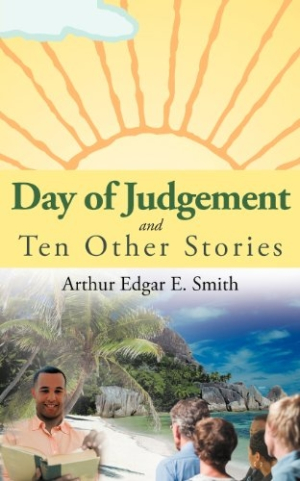Day of Judgement and Ten Other Stories
Arthur Edgar E. Smith compiles folktale adaptations and original writing in Day of Judgement and Ten Other Stories.
Comprised of twelve individual stories, the collection primarily features the folktales Smith has translated from the original Krio language that is native to Sierra Leone. Subject matter varies from cautionary tales to more casual stories, and most follow themes of perseverance or of facing consequences for one’s actions. Smith has also included one story, “Richard Lured into Widely Reading and a Literary World,” that is based on part of American writer Richard Wright’s autobiography, and which effectively demonstrates the reality of discrimination in the 1950s, as well as the importance of determination.
The Richard Wright story is among the most engaging, but one of the more successfully rendered is “The Day of Judgment Has Arrived,” in which greedy, selfish brothers are inspired to change their ways after eavesdropping on a conversation and misconstruing the subject matter. The consequences of selfishness are also explored effectively in “Equiano and His Captain Dream of Suddenly Becoming Rich,” in which insincere overtures of friendship are rewarded accordingly.
In much the same tradition as Uncle Remus’s tales of Brer Rabbit and Brer Fox, the author has included stories with morals or other significance attached, such as “Bra Kakroch (Cockroach) and Bra Fohl (Fowl).” In this tale, readers are shown a fantasy theory of how insects became the prey of birds.
Day of Judgement and Ten Other Stories regrettably suffers from a multitude of editing and proofreading errors. There are formatting issues with incorrect spacing and missing punctuation, occasional misspelled words, and several instances of inconsistent tense. Sporadic confusion in narrative voice is also a problem in many of the stories.
Most problematic in the collection is a tendency to skip definitive conclusions. It is likely that most of the stories originated with the intention of imparting a moral or a lesson through the telling or writing, and this is conveyed effectively through a few of the tales, such as the previously mentioned “Bra Kakroch (Cockroach) and Bra Fohl (Fowl),” and “Bra Spider’s Enjoyment of Bra Rabbit’s Flight of Success.” However, a good number of the stories end abruptly, resulting in unstructured tales that lack cohesion and will likely leave readers scratching their heads as to the intended meaning.
Smith’s goal of sharing these folktales with a wider audience is a commendable one, and there is much of interest in the collection. In addition to more careful proofreading, a meticulous attention to formatting and story structure is needed to bring Day of Judgement to a level of wide appeal.
Reviewed by
Jeannine Chartier Hanscom
Disclosure: This article is not an endorsement, but a review. The publisher of this book provided free copies of the book and paid a small fee to have their book reviewed by a professional reviewer. Foreword Reviews and Clarion Reviews make no guarantee that the publisher will receive a positive review. Foreword Magazine, Inc. is disclosing this in accordance with the Federal Trade Commission’s 16 CFR, Part 255.

